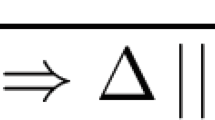Abstract
Handling exceptions represents one of the most important problems in Artificial Intelligence. Several approaches have been proposed for reasoning on default theories. This paper focuses on a possibilistic approach, and more precisely on the MSP-entailment (where MSP stands for Minimum Specificity Principle) from default theories which is equivalent to System P augmented by rational monotony. In order to make this entailment tractable from a computational point of view, we propose here a compilation of default theories with respect to a target compilation language. This allows us to provide polynomial algorithms to derive efficiently the MSP-conclusions of a compiled default theory. Moreover, the proposed compilation is qualified to be flexible since it efficiently takes advantage of any classical compiler and generally provides a low recompilation cost when updating a compiled default theory.
Similar content being viewed by others
References
AbouElKalam, A., Benferhat, S., Miège, A., ElBaida, R., Cuppens, F., Saurel, C., Balbiani, P., Deswarte, Y., Trouessin, G.: Organization based access control. In: Policies for Distributed Systems and Networks (POLICY’03), pp. 120–128 (2003)
Benferhat, S., Bonnefon, J.-F., Neves, R.D.S.: An experimental analysis of possibilistic default reasoning. In: 9th International Conference on the Principles of Knowledge Representation and Reasoning (KR’04), pp. 130–140 (2004)
Benferhat, S., Dubois, D., Cayrol, C., Lang, J., Prade, H.: Inconsistency management and prioritized syntaxbased entailment. In: 13th International Joint Conference on Artificial Intelligence (IJCAI’93), pp. 640–645 (1993)
Benferhat, S., Dubois, D., Prade, H.: Practical Handling of Exception-tainted rules and independence information in possibilistic logic. J. Appl. Intell. 9(2), 101–127 (1998)
Benferhat, S., Yahi, S., Drias, H.: On the compilation of stratified belief bases under linear and possibilistic logic policies. In: 20th International Joint Conference on Artificial Intelligence (IJCAI’ 07), pp. 2428–2430 (2007)
Benferhat, S., Yahi, S., Drias, H.: On the compilation of possibilistic default theories. In: 21st International Florida Artificial Intelligence Research Society Conference (Flairs’08), pp. 613–618. AAAI, Menlo Park (2008)
Boufkhad, Y., Grégoire, É., Marquis, P., Mazure, B., Sais, L.: Tractable Cover Compilations. In: IJCAI (1), pp. 122–127 (1997)
Bouquet, F., Jégou, P.: Using OBDDs to handle dynamic constraints. In: Information Processing Letters, pp. 111–120 (1997)
Cadoli, M., Donini, F.M.: A survey on knowledge compilation. Artif. Intell. Commun. 10, 137–150 (1997)
Darwiche, A.: Decomposable negation normal form. J. ACM 48(4), 608–647 (2001)
Darwiche, A.: A compiler for deterministic, decomposable negation normal form. In: Proceedings of the Eighteenth National Conference on Artificial Intelligence (AAAI), pp. 627–634. AAAI, Menlo Park (2002)
Darwiche, A.: New advances in compiling CNF to decomposable negational normal form. In: Proceedings of European Conference on Artificial Intelligence (2004)
Darwiche, A., Hopkins, M.: Using recursive decomposition to construct elimination orders, jointrees and dtrees. In: Trends in Artificial Intelligence. Lecture Notes in AI, 2143, pp. 180–191. Springer, New York (2001)
Darwiche, A., Marquis, P.: A knowledge compilation map. J. Artif. Intell. Res. 17, 229–264 (2002)
de Kleer, J.: Problem solving with the ATMS. Artif. Intell. 28, 197–224 (1986)
Dubois, D., Lang, J., Prade, H.: Possibilistic logic. Handb Log. Art. Intell. Log. Program. 3, 439–513 (1994)
Dubois, D., Prade, H.: Possibility Theory: An Approach to Computerized Processing of Uncertainty. Plenum, New York (1988)
Goldszmidt, M., Pearl, J.: System-Z+: a formalism for reasoning with variable-strength defaults. In: 9th National conference in Artificial Intelligence (AAAI’91), pp. 399–404 (1991)
Kraus, S., Lehmann, D.J., Magidor, M.: Nonmonotonic reasoning, preferential models and cumulative logics. Artif. Intell. 44(1–2), 167–207 (1990)
Lang, J.: Possibilistic logic: complexity and algorithms. Handb. Defeasible Reason. Uncertain. Manag. Sys. 5, 179–220 (2000)
Lehmann, D.J.: Another perspective on default reasoning. Ann. Math. Artif. Intell. 15(1), 61–82 (1995)
Lehmann, D.J., Magidor, M.: What does a Conditional Knowledge Base Entail?. Artif. Intell. 55(1), 1–60 (1992)
Linke, T., Schaub, T.: An approach to query-answering in Reiter’s default logic and the underlying existence of extensions problem. In: 6th Logics in Artificial Intelligence (JELIA’98), pp. 233–247 (1998)
Linke, T., Schaub, T.: Alternative foundations for Reiter’s default logic. Artif. Intell. 124(1), 31–86 (2000)
McCarthy, J.: Circumscription—a form of non-monotonic reasoning. Artif. Intell. 13(1–2), 27–39 (1980)
Mengin, J.: A theorem prover for default logic based on prioritized conflict resolution and an extended resolution principle. In: 3th Symbolic and Quantitative Approaches to Reasoning and Uncertainty (ECSQARU’95), pp. 301–310 (1995)
Morgenstern, L.: Inheritance comes of age: applying nonmonotonic techniques to problems in industry. In: 15 th International Joint Conference on Artificial Intelligence (IJCAI’97), pp. 1613–1613 (1997)
Nebel, B.: How hard is it to revise a belief base?. In: Handbook of Defeasible Reasoning and Uncertainty Management Systems, pp. 77–145 (1998)
Papadimitriou, C.H.: Computational Complexity. Addison Wesley, Reading (1994)
Pearl, J.: System Z: a natural ordering of defaults with tractable applications to default reasoning. In: 6th Theoretical Aspects of Rationality and Knowledge (TARK’90), pp. 121–135 (1990)
Reiter, R.: A logic for default reasoning. Artif. Intell. 13(1–2), 81–132 (1980)
Sandhu, R.S., Coyne, E.J., Feinstein, H.L., Youman, C.E.: Role-based access control models. IEEE Comput. 29(2), 38–47 (1996)
Schrag, R., Crawford, J.M.: Implicates and prime implicates in random 3-SAT. Artif. Intell. 81(1–2), 199–222 (1996)
Yager, R.R.: On the specificity of a possibility distribution. Fuzzy Sets Syst. 50, 279–292 (1992)
Zadeh, L.A.: Fuzzy sets as a basis for a theory of possibility. Fuzzy Sets Syst. 1, 3–28 (1978)
Author information
Authors and Affiliations
Corresponding author
Rights and permissions
About this article
Cite this article
Benferhat, S., Yahi, S. & Drias, H. A New Default Theories Compilation for MSP-Entailment. J Autom Reasoning 45, 39–59 (2010). https://doi.org/10.1007/s10817-009-9150-9
Received:
Accepted:
Published:
Issue Date:
DOI: https://doi.org/10.1007/s10817-009-9150-9



